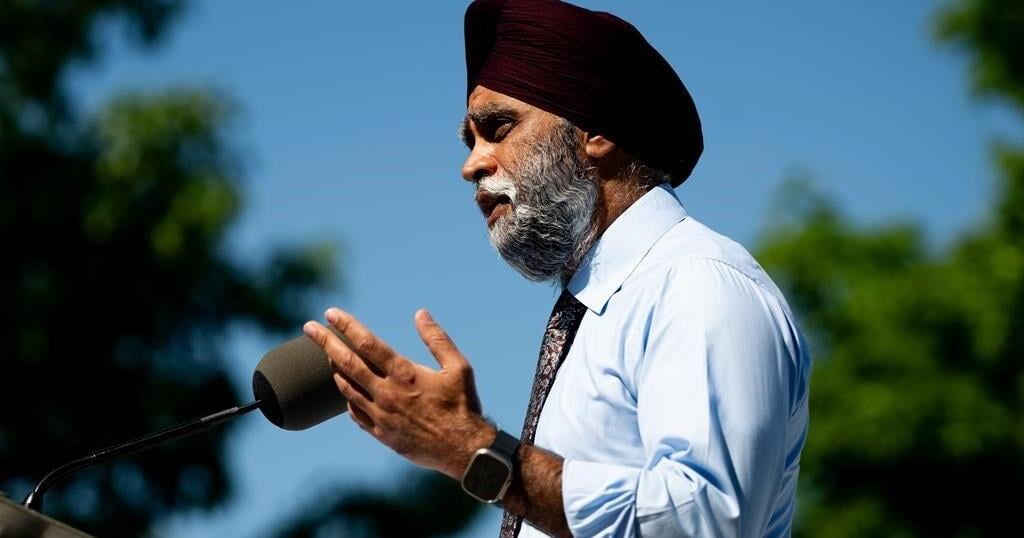OTTAWA – The Canadian Armed Forces was following “legal orders” when it tried to rescue a group of Afghan Sikhs during the fall of Kabul three years ago, Chief of Defence Staff Gen. Wayne Eyre said.
Eyre’s comment came as former defence minister Harjit Sajjan explained his decision to intervene on behalf of a group of around 200 Afghan Sikhs who were trapped along with thousands of others in August 2021.
Sajjan said in a statement that he passed along information through “appropriate” channels that he had been given about the group’s whereabouts and that doing so was in line with government policy to help vulnerable groups on the ground in Afghanistan.
Sajjan said he did not instruct the forces to prioritize this group above Canadians or Afghan interpreters, who aided Canadian soldiers during previous operations.
In an interview with The Canadian Press, Eyre said the military was following “legal orders” when it made an effort to specifically help the group of Afghan Sikhs.
“We follow legal direction and the groups that were listed were part of … approved groups, so we got on with it.”
He added it’s not up to him to say “whether the government priority was right or wrong.”
“We had the list from (Immigration, Refugee and Citizenship Canada) and we were just getting on.”
When Kabul fell to the Taliban in August 2021, Canada and its allies scrambled to evacuate their citizens, along with Afghan interpreters who had worked for Canada.
Canada and other countries also sought to help members of groups they designated as at risk of persecution from the Taliban, including women leaders, human rights defenders, journalists and religious minorities.
Sajjan said that in the weeks leading up to the siege, Canada expanded a partnership with the Manmeet Singh Bhullar Foundation, an Alberta-based charity that was trying to help resettle hundreds of persecuted Afghan Sikhs and Hindus.
The foundation had identified more than 200 Afghan Sikhs who were in Afghanistan and wanted to leave. It provided their names to Immigration, Refugees and Citizenship Canada, which was helping with the required paperwork.
“I provided direction to the Canadian Armed Forces, through the appropriate chain of command, to assist the group of Afghan Sikhs who had been determined eligible for evacuation from Kabul through the process underway at IRCC,” Sajjan said in a lengthy statement.
“The operational details of how and where to do this work was left to military operational commanders and tactical decision-makers on the ground.”
Sajjan said as the situation in Kabul worsened the organization “reached out to me personally” telling him it was unable to connect with the military directly.
“I relayed whatever information the (foundation) provided about the location and status of these Sikhs to the chain of command for it to use as it saw fit, in line with its operational plan on the ground in Afghanistan.,” Sajjan said.
“I did not direct the CAF to undertake a rescue mission at a Gurdwara, or anywhere else.”
“At all times, my message to the (foundation) was the same as the one CAF was delivering directly to the Afghan Sikhs through its own channels: Move toward the airport.”
Sajjan said the priority was “first and foremost” to evacuate Canadians, Afghan translators and those with “significant links to Canada.”
“This was our main effort,” he said. “The evacuation and resettlement of other vulnerable populations, including Sikhs, was also a government priority.”
In a statement, the Manmeet Singh Bhullar Foundation says “it was made abundantly clear” the Afghan Sikhs and Hindus had to find their own way to the airport.
“At no point would the Canadian Armed Forces conduct a rescue mission.”
Eyre said it was chaos on the ground and the military had an “expansive list” of people it was tasked to help.
“Did we have instructions to rescue, or to try and extract this Sikh group? Yes, along with a number of other groups, such as the Afghan women’s soccer team.”
The minister said that ultimately the military was unable to evacuate the group but that they found help through other means.
Both Sajjan and Eyre say they are very proud of what was accomplished during a tumultuous and difficult time, though a parliamentary committee in 2022 said Canada’s efforts both before and after the Taliban took over, were slow and inefficient.
Canada evacuated some 3,700 people from Afghanistan.
The foundation, along with the World Sikh Organization, both said Canada had a humanitarian responsibility to help Afghan Sikhs as persecuted religious minorities.
“There was no doubt that Sikhs, being a very visible minority, would continue to be the target of attacks, World Sikh Organization president Danish Singh said in a statement.
“The attempts to evacuate Afghan Sikhs and Hindus were not about favouritism but about responding to an urgent humanitarian crisis,” he said.
Conservative defence critic James Bezan said in a statement Friday that Trudeau demonstrated a lack of leadership during the evacuation from Kabul because he plunged the country into a snap election.
Trudeau asked for the election campaign to begin on Aug. 15, 2021, the same day the Taliban captured Kabul.
This report by The Canadian Press was first published June 27, 2024.
